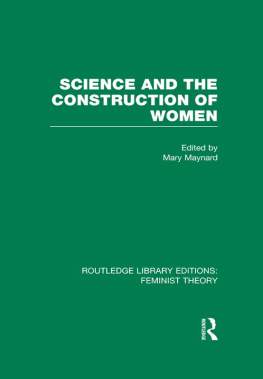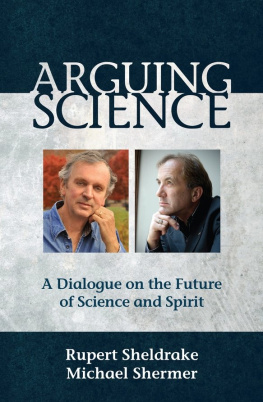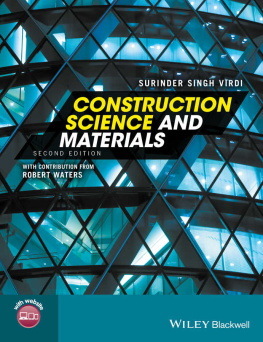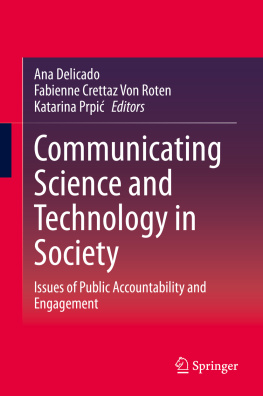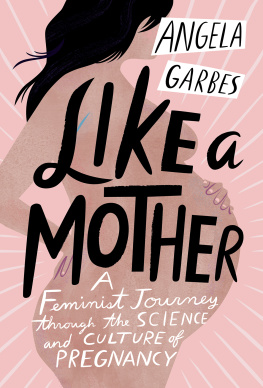ROUTLEDGE LIBRARY EDITIONS: FEMINIST THEORY
SCIENCE AND THE CONSTRUCTION OF WOMEN
SCIENCE AND THE CONSTRUCTION OF WOMEN
Edited by
MARY MAYNARD
Volume 25
First published in 1997
This edition first published in 2013
by Routledge
2 Park Square, Milton Park, Abingdon, Oxon, OX14 4RN
Simultaneously published in the USA and Canada
by Routledge
711 Third Avenue, New York, NY 10017
Routledge is an imprint of the Taylor & Francis Group, an informa business
1997 Mary Maynard and contributors
All rights reserved. No part of this book may be reprinted or reproduced or utilised in any form or by any electronic, mechanical, or other means, now known or hereafter invented, including photocopying and recording, or in any information storage or retrieval system, without permission in writing from the publishers.
Trademark notice: Product or corporate names may be trademarks or registered trademarks, and are used only for identification and explanation without intent to infringe.
British Library Cataloguing in Publication Data
A catalogue record for this book is available from the British Library
ISBN: 978-0-415-53401-7 (Set)
eISBN: 978-0-203-08796-1 (Set)
ISBN: 978-0-415-63700-8 (Volume 25)
eISBN: 978-0-203-08487-8 (Volume 25)
Publisher's Note
The publisher has gone to great lengths to ensure the quality of this reprint but points out that some imperfections in the original copies may be apparent.
Disclaimer
The publisher has made every effort to trace copyright holders and would welcome correspondence from those they have been unable to trace.
Science and the construction of women
Science and the construction of women
Edited by
Mary Maynard
Mary Maynard and contributors, 1997
This book is copyright under the Berne Convention.
No reproduction without permission.
All rights reserved.
First published in 1997 by UCL Press
UCL Press Limited
1 Gunpowder Square
London EC4A 3DE
UK
and
1900 Frost Road, Suite 101
Bristol
Pennsylvania 19007-1598
USA
The name of University College London (UCL) is a registered
trade mark used by UCL Press with the consent of the owner.
British Library Cataloguing-in-Publication Data
A CIP catalogue record for this book is available from the British Library.
Library of Congress Cataloging-in-Publication Data are available
ISBNs: 1-85728-786-X HB
1-85728-787-8 PB
Typeset in 10/12pt Times by Best-set Typesetter Ltd, Hong Kong
Printed and bound in Great Britain by SRP Ltd, Exeter
Contents
Mary Maynard
Hilary Rose
Nancy J. Lane
Ailsa Swarbrick
Jean Barr and Lynda Birke
Cecilia Ng Choon Sim and Rohini Hensman
Anne Scott
Pat Spallone
Elizabeth Sourbut
Jenny Wolmark
Acknowledgements
The editor is grateful to Elsevier Science Limited for permission to reprint the article by Jean Barr and Lynda Birke, Women, science and adult education: Towards a feminist curriculum?, which first appeared in Women's Studies International Forum, , 5, 1994, pp. 47383, and to the editors of the Journal of Gender Studies for permission to reprint the article by Cecilia Ng Choon Sim and Rohini Hensman, Science and technology: Friends or enemies of women?, which first appeared in the Journal of Gender Studies, , 3, 1994, pp. 27787.
Chapter 1
Revolutionizing the Subject: Women's Studies and the Sciences
Mary Maynard
Introduction
Amidst the boom in publishing, teaching and research which has accompanied the growth of western women's studies,1 it seems that less attention has been afforded to the natural sciences or technology than to other disciplinary areas. This is not to say, of course, that there has not been some significant work in these fields. Writers such as Donna Haraway, Sandra Harding and Evelyn Fox Keller, for example, have developed sustained philosophical and epistemological critiques of scientific rationality, while others, Cynthia Enloe and Cynthia Cockburn, for instance, have examined the patriarchal and manipulative usages of technology (Cockburn, 1983, 1985; Cockburn and Fiirst-Dilic, 1994; Cockburn and Ormrod, 1993; Enloe, 1989; Haraway, 1989, 1991; Harding, 1986, 1991, 1993; Keller, 1985, 1993). Further areas which have attracted attention are those of reproductive technology and genetic engineering (Arditti, Duelli Klein and Minden, 1984; Spallone, 1988, 1992; Stanworth, 1987). This is especially in relation to the ways in which women are objectified into body parts and reduced to the carriers of male genetic material. In addition to research and publications emanating from the US, Australia and Britain, important analytical and critical work on science has also emerged from European networks, such as the Danish Gender-Nature-Culture group and the feminism and science cluster of the Network of Inderdisciplinary Women's Studies in Europe (NOI SE) (Lykke and Braidotti, 1996; Lykke, Bryld and Markussen, 1992). In general, however, most western women's studies courses, whether undergraduate or graduate, have tended to focus their concerns on the humanities or social sciences. Science seems to have been able to maintain a stronger resistance to feminist influences and has featured less prominently on the women's studies agenda (Harding, 1986).
Recently, two British feminists, Linda Birke and Hilary Rose, both of whom have published extensively on matters to do with feminism and science and who are also both contributors to this volume, have commented upon the anti-science feeling that seems to exist in women's studies and in feminism more generally. Birke, for instance, points out that, compared to some subjects, there is relatively little interest in science within the women's movement or women's studies, except around specific issues such as women's health, and comparatively few women's studies books or courses that explicitly address science and technology (1994). She refers to science as hostile territory, not just in terms of her experiences in the laboratories of academia, but in the women's movement as well. Discussing this hostility, Birke remarks: I remember when I was surrounded by several women who wanted to know how I could possibly be doing research in science because it was so heavily patriarchal. I did wonder at the time and I'm still wondering since why science gets singled out. Can you name one area of the academy that isn't patriarchal? (1994: 187).
Rose also identifies an anti-science tendency within feminism. Focusing, in particular, on what she refers to as the postmodern deluge, Rose is critical of this development because, she argues, an over-emphasis on language and discourse leads to a refusal to distinguish between true and false knowledge and good and bad science (1994: 23). She suggests that postmodernism's relegation of the contest between more and less truthful accounts, to one about different stories that we may choose to believe or not, is immensely politically damaging. Crucially, such an anti-science position denies the possibilities of either developing empowering knowledge or of making practical social interventions.

